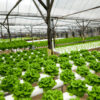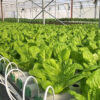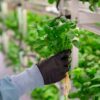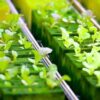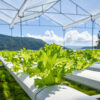Crops are grown using a technique known as hydroponics farming, sometimes known as “soilless farming in pune. ” The roots of the plants in a hydroponic system develop in a liquid nutrient solution or inside moist inert substances like Rockwool and Vermiculite. The liquid nutrient solution is made by combining water and necessary plant nutrients.
The plant roots are suspended either by a static liquid solution or a continuously flowing nutrient solution. Unlike conventional farming, the hydroponic growing system necessitates constant attention to the crops.
Advantages of Hydroponic farming:
- The plant nutrients are utilized effectively, there is no loss, and the yield is higher than the traditional farming system.
- Crops may grow all year round in the hydroponic system, which has a controlled environment.
- When compared to the conventional farming method, water use is minimal—up to 80%–90% less.
- Because the crops are produced in a confined environment, insects and pests cannot harm them.
- Each Hydroponic crop may require a distinct hydroponic system and growth techniques. Knowing the fundamentals of each hydroponic system before picking one over another will aid you in your decision.
Services Provide By croptek:
- Hydroponic commercial project
- fan and pad polyhouse
- naturally ventilated polyhouse
- shade net house
- indoor hydroponic projects
- different hydroponic system
- landscaping
- orchard project development
- home/terrace/kitchen garden set up
- microgreen cultivation
As the world’s population grows, the agricultural sector is developing novel ways to produce food while utilizing less water and land.





